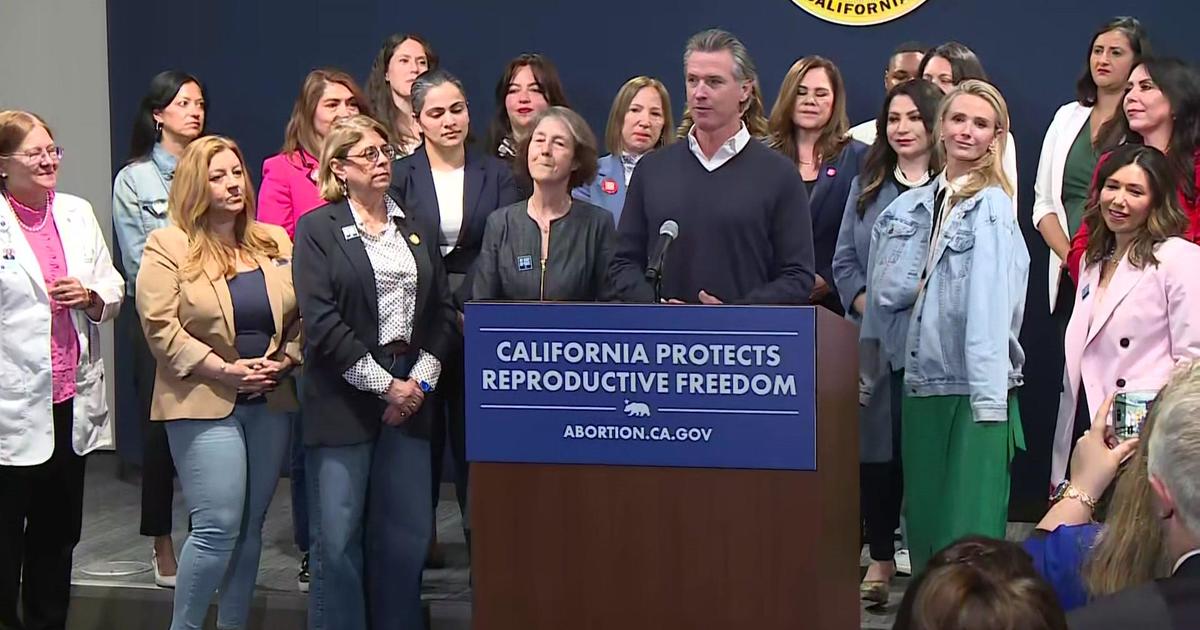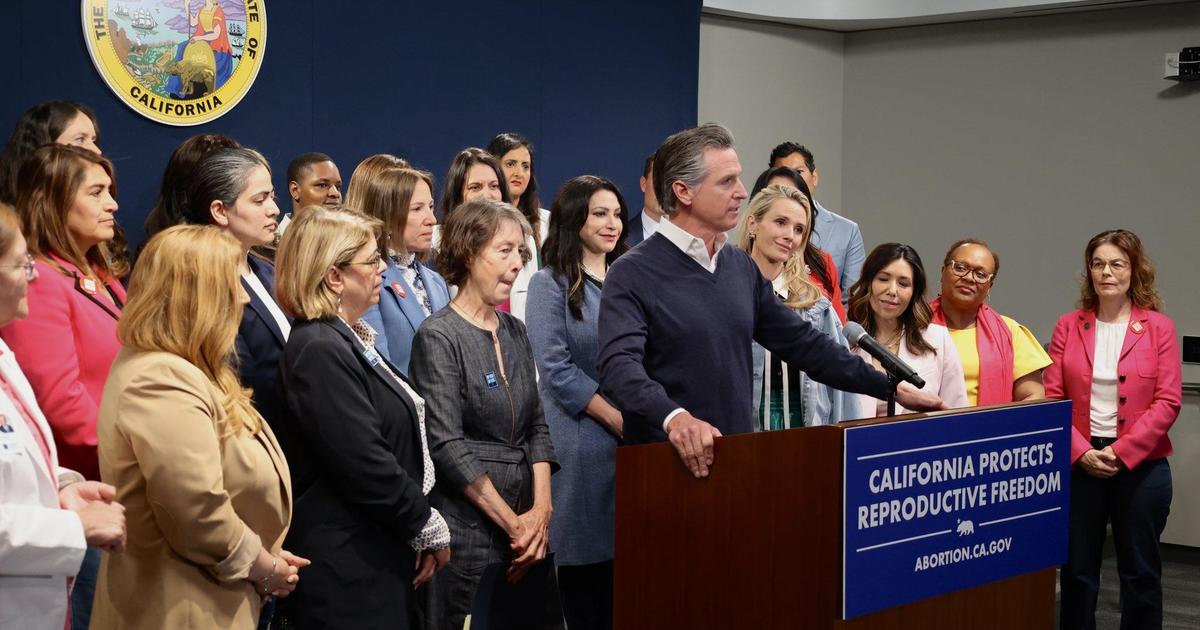Campaign 2014: Jerry Brown Promotes Restraint In Bid For Fourth Term As California Governor
SACRAMENTO, Calif. (AP) - Mandarin Restraint and steady progress don't necessarily make for catchy political slogans. But a sure-handed approach to managing California's fiscal recovery is Gov. Jerry Brown's central pitch to voters as he seeks re-election to an unprecedented fourth term as governor.
The Democratic governor is promoting the state's improved fiscal health since he retook the office in 2011, as well as promoting his restructuring of California's education finance system and a November ballot measure seeking to spend $7.5 billion to improve the state's water supplies.
He also has been criticized for being too cozy with union interests, pushing a contentious water-tunnel plan and pressing ahead with a $68 billion high-speed rail project.
NAME - Edmund G. "Jerry" Brown Jr.
AGE-BIRTH DATE-BIRTHPLACE - 72; April 7, 1938; San Francisco.
PARTY - Democratic.
EXPERIENCE - California governor, 2011-present, California attorney general, 2007-2011; mayor of Oakland, 1998-2006; state Democratic Party chairman, 1989-1991; California governor, 1975-1983; California secretary of state, 1971-1974; Los Angeles Community College Board of Trustees, 1969 to 1971. Ran unsuccessfully for the Democratic presidential nomination in 1976, 1980 and 1992. Worked as a law clerk to California Supreme Court Justice Mathew Tobriner and at Los Angeles law firms in the 1960s and 1980s.
EDUCATION - Bachelor's degree, University of California, Berkeley, 1961; law degree, Yale University, 1964.
FAMILY - Wife, Anne Gust.
QUOTE - "I love this state and I know it works and I can tell you that in the last four years, we haven't solved all the problems, but boy what momentum we have."
During a September debate with his Republican rival, former U.S. Treasury official Neel Kashkari, the 76-year-old governor touted the experience he has accumulated after a lifetime in government and politics.
"Things don't get done with a press release or a glib statement. They take many, many years," he said.
Brown was referring to the state's continued massive shortfall in its public pension obligations, but it also sums up his approach to governing.
Since returning to Sacramento after first serving as governor from 1975 to 1983, Brown has made good on campaign promises to overhaul education financing, eliminate a $26 billion budget deficit and make changes to the public employee retirement system. He also overhauled the criminal justice system to send lower-level offenders to county jails rather than state prisons in response to federal court orders.
CAMPAIGN 2014
- Campaign 2014: Neel Kashkari Aims To Rebrand GOP In California Gubernatorial Bid
- Campaign 2014: Where Do Brown, Kashkari Stand On Issues Facing California
- Campaign 2014: California State Controller's Race Gives Voters A Stark Contrast
- Campaign 2014: California Superintendent Race May Be Election's Tightest
- Campaign 2014: Marijuana An Issue In California Attorney General Race
- Campaign 2014: California Lieutenant Governor Candidates See Job's Potential
- Campaign 2014: Termed-Out California Controller John Chiang Turns Eyes Toward Treasurer
- Campaign 2014: Similar Ideas Mark Race For California Secretary Of State
- Campaign 2014: Seventh Congressional District Is One Of Most Competitive In Nation
- Campaign 2014: Historic Drought Is Background For Proposition 1 Water Bond Vote
- Campaign 2014: Proposition 2 Would Overhaul California's Rainy Day Fund
- Campaign 2014: Proposition 45 Seeks Rate Review By California Insurance Commissioner
- Campaign 2014: Proposition 46 Seeks To Raise California's Medical Malpractice Cap
- Campaign 2014: Proposition 47 Lowers Penalty For Some Crimes In California
- Campaign 2014: Proposition 48 Puts California Tribe's Casino Plan Before Voters
Brown has retreated on tackling other problems, such as overhauling the burdensome California Environmental Quality Act. California also still has a top-heavy tax structure that relies on high-income earners, a system that swells coffers during boom times but also helped create the massive budget deficit Brown inherited.
Environmentalists oppose his $25 billion plan to build two massive twin tunnels under the Sacramento-San Joaquin River Delta, his high-speed rail project has been tied up in litigation, and California-based Tesla just announced it would build its $5 billion battery factory in Nevada instead of California, despite the Brown administration's lobbying.
The budgets Brown has signed since taking office have been a signal that California regained its financial footing after the recession, said Jerry Nickelsburg, a senior economist at the UCLA Anderson School of Management. But he added: "The big issues that gave rise to government deficits have not gone away. ... So that problem has not been solved in Sacramento."
Outstanding issues include increased mandated spending for pensions, social services and other programs, Nickelsburg said, as well as California's reliance on temporary revenue from Proposition 30, the increases in the statewide sales tax and income tax on high earners that Brown persuaded voters to approve in 2012. The sales tax is set to expire in 2016 and the income tax in 2018, although unions are expected to fund a campaign trying to make the increases permanent.
Brown's fiscal policies and his ability to rein in liberal Democrats in the Legislature have been praised by business leaders who typically side with Republicans. He also negotiated with Republicans on the $7.5 billion water measure and the rainy day fund proposal on the November ballot.
At the same time, Brown has delivered for his Democratic union allies, signing bills to increase the state's minimum wage to $10 an hour by 2016, requiring employers to provide at least three paid sick days a year to many private sector workers and joining a recent appeal of a Los Angeles court ruling that concluded California's teacher tenure system is unconstitutional. Fighting it is the top priority of the wealthy California Teachers Association.
Brown has amassed nearly $24 million in seeking to become California's first four-term governor and leads Kashkari by 20 percentage points among likely voters in recent polls.
Business groups that have been relatively muted in criticizing Brown could step up the pressure on him to buck union interests if he wins re-election.
"The business community as a whole is gravely concerned about its competitiveness in terms of attracting long-term growth and jobs," said Rob Lapsley, president of the California Business Roundtable, which represents private employers.
The group supported Brown's education reforms and has lauded the state's financial recovery. But Lapsley said companies are sitting on "billions and billions and billions" of dollars that could be invested in the state if California reformed its policies.
"Education, pensions, salaries, infrastructure, transportation - all of that can get funded if we can unleash our economic potential," he said.
Copyright 2014 The Associated Press.



